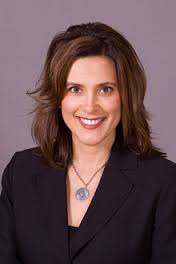A few months ago, it looked like the only thing standing in Gretchen Whitmer’s way was Dan Kildee.
Whitmer, a Democratic former state Senate minority leader, leapt into the 2018 gubernatorial sweepstakes just after the New Year, while hopefuls in both parties were still issuing (not very convincing) denials about running. Most politicos (myself included) expected Kildee to get in, as the congressman has kept a very high profile during the Flint water crisis.
But even as Kildee has continued to waver between keeping a safe U.S. House seat and taking the plunge for state CEO, a new threat is emerging to Whitmer’s nomination.
And it’s coming from a very unlikely place.
When Dr. Abdul El-Sayed announced he was running for governor back in February, even Democratic insiders had to Google him. Sure, some people knew him from his work running the Detroit Health Department under Mayor Mike Duggan or from his Crain’s “40 Under 40” profile, but that was about it. He was 32, had never run for office and didn’t appear to be very politically active.
The last part was confirmed last week on WKAR’s “Off the Record,” when El-Sayed admitted he didn’t even vote in the 2016 presidential primary. But he did tell the panel that he would have voted for Bernie Sanders, who pulled out an upset win against Hillary Clinton.
And that helps explain why there’s growing grassroots enthusiasm for the man who would become the nation’s first Muslim governor. This isn’t readily apparent to those in Lansing, many of whom have known Whitmer for decades and have assumed she’s a lock.
But a lot of activists, particularly millennials, are psyched about El-Sayed. They like that he’s an outsider who’s never run for office. While plenty of Democratic lawmakers — particularly women — took offense when El-Sayed openly scoffed on OTR at Whitmer’s 14-plus years in the Legislature, many voters don’t consider political experience to be an asset anymore. Those on the far right and far left view holding elected office as a corrupting force.
It’s true that it’s hard to get to Whitmer’s left. She’s probably best known for her pro-choice and pro-LGBT views. But those positions are a given with the Democratic base. What a lot of activists are looking for is candidates who campaign on Bernie’s platform of slamming Wall Street and getting money out of politics. Outsiders like El-Sayed are in a better position to sell that agenda.
El-Sayed is busy making moves to show he’s for real. He’s been traveling the state and said on OTR that he’s raised $500,000 already, which isn’t chump change. And he’s hired a veteran campaign manager in Max Glass, who worked for Sanders favorite U.S. Rep. Tulsi Gabbard (D-Hawaii).
The biggest question in the Democratic gubernatorial primary has always been where Sanders voters would go. In a Kildee vs. Whitmer contest, that wasn’t readily apparent, as both are establishment figures who served as Clinton surrogates. But if Kildee sits this one out, the Dem gubernatorial primary could morph into Sanders vs. Clinton, Part II, between El-Sayed and Whitmer.
This is a scenario that causes many Whitmer backers and political insiders to roll their eyes. She’s expected to clean up with money and endorsements. She hails from a political family and has an experienced team. He’s the longest of longshots as a religious minority who nobody’s heard of.
Of course, those are all arguments that people made in the ‘16 Michigan presidential primary.
It’s way too early to predict an El-Sayed Sanders-style upset next year. We’re 15 months out and the field isn’t even set. But it would be arrogant to dismiss the idea out of hand.
If 2016’s surprises didn’t teach you to question your political assumptions, I can’t really help you.
Susan J. Demas is Publisher and Editor of Inside Michigan Politics, a nationally acclaimed, biweekly political newsletter. Her political columns can be found at SusanJDemas.com. Follow her on Twitter here.



